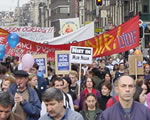 Go to main content
Go to main content
Archive Website of the UK government
Please note that this website has a UK government accesskeys system.
Main menu
Page menu
Government, citizens and rights

Right to protest

The right to peaceful protest is a vital part of democracy, and it has a long, distinguished history in the UK. Here’s some basic information about protests, as well as a few other ways in which you can make your voice heard.
Peaceful protests
Taking part in a demonstration, rally or protest is a high-profile way to take a stand on issues important to you. Protests can make a real difference – leading to changes in governmental policies and laws. Peaceful protests allow people to come together and stand up for what they believe in, and can be a very effective way of promoting change.
The Human Rights Act
The Human Rights Act protects freedom of expression and freedom of assembly – these form the basis for your right to gather with others and protest.
The act forbids governments and other public bodies (including police) from violating these rights. However, it does allow for some limitations on these rights in order to prevent unrest, violence and crime, and for the protection of the rights and freedoms of others.
The police work to balance the right to protest with the right of other people to go about their lives safely and freely.
Organising a protest
Tell the police if you are organising a protest
The key message from police and local authorities to protesters is always ‘let us know’.
Protests are most likely to avoid confrontation with local residents or workers, or the involvement of police, if organisers:
- notify the police in advance of their plans for the protest
- advise them of expected numbers
- apply for a permit if one is required or requested
If you are organising a march, you are legally required to notify the police six days in advance, or as soon as it is reasonably practical to do so. If you are organising a protest rally that will not involve a march, you are not obliged to notify the police, but you may still want to let them know.
This courtesy allows local authorities to prepare for the gathering, to divert traffic if necessary to ensure the safety of the protesters, and to alert local residents to the disruption they’re likely to face.
Protest and police powers
Police have a duty to provide protection and assistance for peaceful protests, but they must balance that with an obligation to preserve the peace, uphold the law and prevent crime. Individual chief police officers decide how to handle each protest in their area.
Violent activity cannot be regarded as a legitimate form of protest, and the police have the legal right to arrest and charge those who commit acts of violence during protests.
Police have many legal powers that can be used to prevent violence or unrest associated with protest. They can, for example, impose limitations on the route of the march, or the location and duration of a rally.
They will only do that in order to prevent:
- riots or other serious public disorder
- damage to property
- serious disruption to the life of the community
Police might also conduct ‘stop and search’ operations around a protest, but they must do so for a specific reason. Because of this, if they stop and search you, they must always specify on what legal grounds they are doing it.
Anti-social behaviour rules and dispersal orders can also be used to break up violent or unlawful protests.
A sit-down protest or a blockade – even a peaceful one – can be stopped if it blocks road traffic or public walkways. Any racist chants or threats of violence – even in an otherwise peaceful protest – are not acceptable, and those involved could be arrested and charged.
Alternatives to public protests
Organising a petition is an alternative to staging a protest
Public demonstrations may be the most high-profile way to express your opinions, but there are other equally effective methods to make your voice heard.
For example, you could:
- talk with your MP in person at a local surgery in your constituency
- write a letter to MPs and members of the House of Lords
- start or sign a petition and present it to your MP
- start or sign a petition on the Number 10 website
- start a website or blog expressing your views
- get involved in politics yourself – run for office
- join a political party and argue for your cause
Sometimes making your case directly to those who have made decisions with which you disagree can be more effective than protesting.
